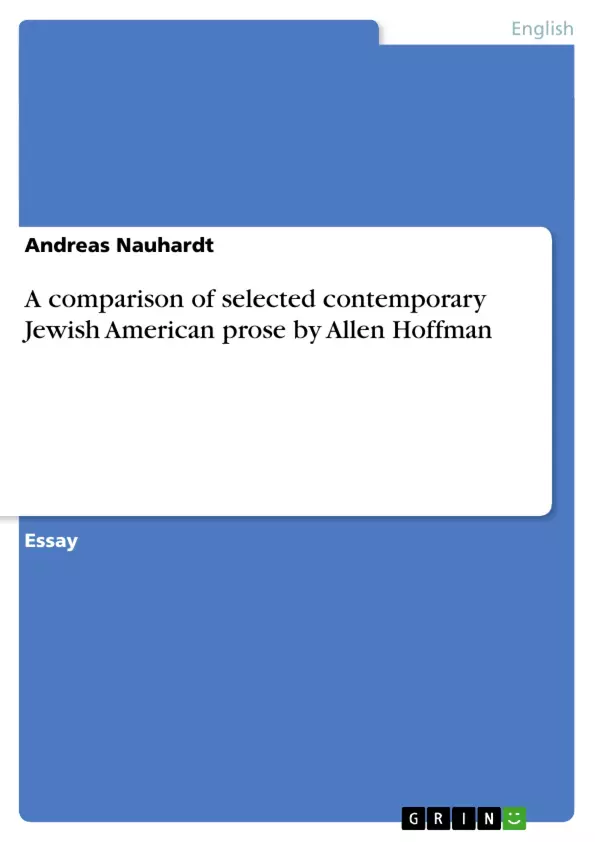About twenty years ago Bonnie K. Lyons suggested that every writer, regardless of which cultural origin, writes out of a culture serving as the battlefield of conflicting visions and values. Eventually, the writer may either embrace or attack his cultural heritage. At a first glance it seems to be indefinite where to pigeonhole the abstract above regarding to Lyons’ndistinction but after opening oneself to the tales of the reviewed contemporary Jewish American writer the classification becomes definite. Taken from one of his short stories, the excerpt gives a brief glimpse into the authentic, exhilarant writing of Allen Hoffman. Truly refreshing characters who argue about things of mundane and devout significance as well as the usage of partially genuine parallels to the autho himself determine Hoffman’s prose which has sustainable effects on readers. He covers Jews, Jewish values, and idiosyncratic Jewish topics as actually urgent and particular characteristics of Jewish American prose. Although his literature comprises humorous and ironic valuations the respect and appreciation for the Jewish culture in times of clashes between tradition and renewal never gets lost.
Inhaltsverzeichnis (Table of Contents)
- Introduction
- Journeys told from the Holy City to the United States
- The importance of passion
- Converse developments
Zielsetzung und Themenschwerpunkte (Objectives and Key Themes)
This essay explores the work of contemporary Jewish American writer Allen Hoffman, analyzing his use of narrative voice, literary styles, and themes. The focus is on three short stories from his collection "Kagan's Superfecta: And Other Stories," namely "Balancing Acts," "Building Blocks," and "Hymie The Torch." The essay aims to illustrate the causes of Hoffman's success by comparing and contrasting these stories' distinctive literary elements.
- The exploration of Jewish identity and tradition in a contemporary American context
- The interplay of cultural heritage and personal experience in shaping individual narratives
- The role of passion in driving individual actions and shaping character development
- The impact of historical events, such as the Holocaust, on individual and communal consciousness
- The complexities of cultural adaptation and the challenges of reconciling different cultural experiences
Zusammenfassung der Kapitel (Chapter Summaries)
The introduction sets the stage by discussing Bonnie K. Lyons' theory about writers and their cultural backgrounds, suggesting that Hoffman's work embodies this concept. It highlights Hoffman's distinctive style, which combines humor, irony, and a deep respect for Jewish culture. The essay then delves into a specific literary trend within Jewish American fiction since the 1970s, emphasizing Hoffman's contribution to this genre.
The chapter "Journeys told from the Holy City to the United States" examines the settings and characters in Hoffman's stories. It introduces Hymie Grosbart, the protagonist of "Hymie The Torch," whose passion for fire leads to arson. The chapter then explores the theme of Jewish tradition through characters' observance of religious rituals and their struggles to maintain their heritage in a modern world.
The chapter "The importance of passion" focuses on the protagonists' passions and their impact on their lives. It highlights the contrasting passions of Hymie Grosbart, whose passion for fire leads to destructive actions, and the protagonist of "Balancing Acts," whose passion for art leads to creative expression. The chapter also delves into the spiritual significance of passion within Judaism.
The chapter "Converse developments" analyzes the character arcs of the protagonists in "Balancing Acts" and "Hymie The Torch." It shows how the protagonist of "Balancing Acts" undergoes a transformation from confusion to peace while grappling with the challenges of adapting to a new life in Jerusalem. Similarly, it explains how Hymie Grosbart's passion for fire morphs into fear after witnessing the horrors of the Holocaust.
Schlüsselwörter (Keywords)
The key terms and concepts central to this essay are: contemporary Jewish American literature, narrative voice, literary style, cultural heritage, passion, individual identity, Jewish tradition, cultural adaptation, Holocaust, and Jewish spirituality.
Frequently Asked Questions
Who is Allen Hoffman and what characterizes his writing?
Allen Hoffman is a contemporary Jewish American writer known for his authentic, humorous, and ironic prose. His work often features characters struggling with mundane and devout significance while maintaining a deep respect for Jewish culture.
What are the main themes in Hoffman's short stories?
Key themes include the exploration of Jewish identity in modern America, the clash between tradition and renewal, the impact of the Holocaust, and the role of passion in shaping individual lives.
How does the Holocaust influence the characters in Hoffman's work?
Historical events like the Holocaust are shown to haunt the individual and communal consciousness. For example, in "Hymie The Torch," the protagonist's obsession with fire is deeply linked to the trauma witnessed during the Holocaust.
What stories are analyzed in this essay?
The essay focuses on three stories from the collection "Kagan's Superfecta": "Balancing Acts," "Building Blocks," and "Hymie The Torch."
How does Hoffman use humor in his literature?
Hoffman uses humor and irony to portray the complexities of cultural adaptation and daily religious life, making his characters relatable and refreshing without losing appreciation for Jewish heritage.
- Arbeit zitieren
- Andreas Nauhardt (Autor:in), 2009, A comparison of selected contemporary Jewish American prose by Allen Hoffman, München, GRIN Verlag, https://www.grin.com/document/138240



